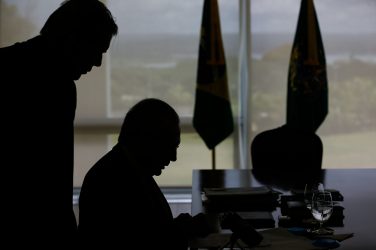
Brazil’s Senate President Renan Calheiros said that he will meet with party leaders next week to decide the details and rules for the impeachment trial of Brazil’s President Dilma Rousseff, who is currently suspended from office.
According to Calheiros, the session will begin on August 25 and is expected to take at least three days. “I hope we won’t stretch it into a fourth,” he said.
The decision on whether the hearing will continue into the weekend or adjourned until Monday is expected to be made at next week’s meeting.
“Chief Justice Lewandowski has asked us to hold this meeting once we have the service of process upon the president and deadlines for the defense and prosecution have been met so we can draw up a roadmap for the trial session,” he said.

Senate Workers’ Party (PT) Leader Humberto Costa said Brazil’s suspended President Dilma Rousseff is planning to present a letter about the impeachment case against her by next Tuesday, August 16.
According to Senator Costa, who had a lunch meeting with the president at Alvorada palace, her official residence, the letter will express Rousseff’s personal views and get back to her proposal of holding a referendum to let the population decide if it wants an early presidential election.
According to Costa, Rousseff wants to share her thoughts and address the Brazilian population and the Senate, which will act as court in her impeachment trial. “She is going to give a review of the situation, look into what this move represents and what the consequences will be for Brazil,” Costa said.
According to the senator, the letter will be an important initiative “because each of the senators make their final decision now. And judging by the dissatisfaction around, I think we have a chance to grow our vote base against impeachment.”
For Costa, there is still room for Rousseff’s allies to work to avert an impeachment vote. He said there are some eight or ten senators they would like to talk to more closely to in an attempt to change the vote outcome.
At least 54 votes are required to impeach Rousseff at the final trial in Senate. Fifty nine senators voted against the president when deciding if the impeachment procedure should go on. Many analysts are skeptical these legislator would change their mind and vote in favor of the suspended president.
Campaign Probe
Superior Electoral Court (TSE) Justice Maria Theresa Moura issued a ruling asking the court’s officials to investigate alleged accounting irregularities with Senator Aécio Neves’s 2014 presidential election campaign. His accounts have not been audited yet because the Electoral Court handles elected candidates’ cases first.
The ruling comes as a result of impropriety allegations made in April by the adversary Workers’ Party (PT), which said Neves’s campaign had hired services from unqualified providers. Moreover, according to the Workers’ Party (PT), there were a “large amount” of bank transactions and evidence of some of these providers being shell companies.
Justice Moura has asked TSE officials in collaboration with the Federal Revenue Service and the Federal Court of Audits to investigate the financial statements provided by the companies that provided services to Aécio Neves, the list of employees hired, and which businesses were established in 2014, the year of the election.
In another statement about the process, the legal counsel for Neves’s party, the Brazilian Social Democracy Party (PSDB), maintained that there were no improprieties with his campaign finance.
“The allegations are completely unfounded and are clearly politically motivated. It will all be clarified in due course as there are no irregularities,” the PSDB statement read.
Housing
The federal government is to resume the building of over 10,000 housing units as part of the previously interrupted Minha Casa Minha Vida affordable housing program, according to an official announcement. The government will also allow families with a gross monthly income of up to US$ 750 to benefit from the initiative.
According to the program’s website, funds will be made available for units of up to US$ 43,000, at an interest rate of 5% per month. First launched under former President Lula in 2009, Minha Casa Minha Vida is an initiative that makes it easier for low-income families to purchase their own house. It serves families in need of housing according to location (country or city), income, and the price of a housing unit.
The plan also helps increase employment and raise income in construction. Due to the economic crisis facing the country and its impact on the public accounts, a number of units had been put on hold.
New Deals
In his statement, Cities Minister, Bruno Araújo, announced that “funds adding up to US$ 1.2 billion will be made available to families with a monthly income of US$ 750.” Some 40,000 new housing units are expected to be contracted.
According to the minister, acting President Michel Temer had already declared that 4,232 units were to have their construction resumed.
“Of the 50,000 halted units, there remain a total 35,000 units. We’re committed to bringing it down to zero,” he pledged.
Since 2009, the federal government invested US$ 98 billion in the Minha Casa Minha Vida program with a view to contracting over 4.3 million housing units, which, according to data from the ministry, benefited 3 million families across the country. “I take this opportunity to announce that we will contract 600,000 units in 2017,” said the minister.
Government Plan
Acting President Michel Temer said that resuming the works under Minha Casa Minha Vida will help the country make social strides on a number of fronts, as the initiative “serves those with a lower pay, generates employment, and boosts the private enterprise.”
“Minha Casa Minha Vida is a government project, not the project of individuals,” the interim president noted. The program, first launched in 2009 under former President Lula, was designed to make it easier for low-income families to buy their own house.
“We shouldn’t regret what happened. Rather, we should say that this is the situation, and that we will move forward,” Temer highlighted. “Prosperity isn’t possible without civil construction, since our needs in infrastructure are dire,” he added.
“We know that there’s a portion of the population that’s still below the extreme poverty line, and that’s what justifies Minha Casa Minha Vida, now that we’ve reviewed it.”
ABr










